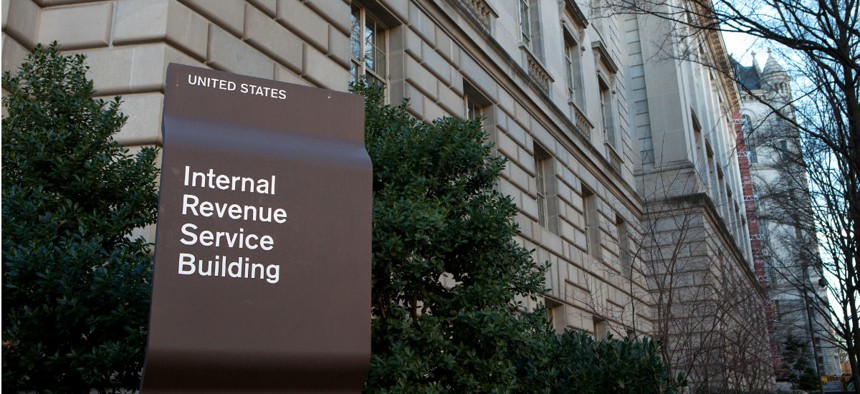
Mark Van Scyoc / Shutterstock.com
IRS Phone Service Got Much Worse in an Otherwise Solid Filing Season
Watchdog says agency planned ahead for last-minute tax law changes.
This story has been updated.
Just as leaders at the Internal Revenue Service had warned, the level of toll-free telephone service the agency provided to taxpayers during the 2015 filing season dropped precipitously compared to previous years as a result of budget cuts, a watchdog found.
In answering 8.3 million calls this winter and spring, the IRS achieved a level of service of only 37.6 percent —about what managers forecast, said a report released Monday by the Treasury Inspector General for Tax Administration. “It should be noted that the level of service for the 2014 Filing Season was 70.8 percent,” auditors said. The average wait time for callers rose to 23.5 minutes, up from 14.4 minutes in 2014.
Overall, the IRS’s performance was judged effective in such areas as reducing tax fraud, computerization and implementing the 2010 Affordable Care Act (the agency’s most far-reaching changes in 20 years, TIGTA said).
“The IRS was challenged by the late enactment of tax provisions that were set to expire,” the report said. “To reduce the impact on the filing season, the IRS monitored the status of the extender legislation and took steps prior to its enactment to prepare for the extension of these provisions. These efforts enabled the IRS to begin accepting and processing individual tax returns on January 20, 2015, as scheduled.”
Despite budget cuts, the agency handled 137.3 million tax returns (up slightly from 2014) and made progress in curbing identify theft, unmerited claims for the earned income tax credit and tax fraud committed by prisoners. As of May 2, 2015, the IRS had identified 163,087 tax returns with more than $908.3 million claimed in fraudulent refunds, and had prevented issuance of some $787 million (86.6 percent) in fraudulent refunds.
“The decrease in the number of fraudulent tax refunds resulting from identity theft that the IRS detects and stops is attributable to expanded IRS processes to prevent fraudulent tax returns from entering the tax processing system,” the audit said.
As of April 2015, the IRS had “locked” about 28.4 million taxpayer accounts of deceased individuals. The agency then prevented some 77,000 fraudulent electronic returns and 16,000 paper returns from being entered in its Master Files.
The IRS generally was accurate in its processing of eight taxpayer claims that Congress extended, such as the state and local general sales taxes deduction and the mortgage insurance premium deduction. An exception was its handling of the educator expense deduction claims—auditors identified 263 tax returns for which the IRS incorrectly denied that deduction, totaling $53,988.
Auditors noted that too many tax return preparers continue to misuse the split refund option to divert a portion of taxpayers’ refunds to tax return preparer–controlled bank accounts, a practice the agency has shown progress in working to discourage.
TIGTA recommended that the agency revise computer programming to ensure that no more than three direct deposits are made to a single bank account, and that tax returns for which the IRS incorrectly denied taxpayers the educator expense deduction are reviewed to ensure that the individuals receive the tax benefits to which they are entitled.
The IRS agreed with both recommendations. "The aggressive efforts by the IRS protected billions of dollars and helped the vast majority of taxpayers get their tax refund in 21 days or less," the agency said in a statement on the TIGTA report.
(Image via Mark Van Scyoc / Shutterstock.com)







